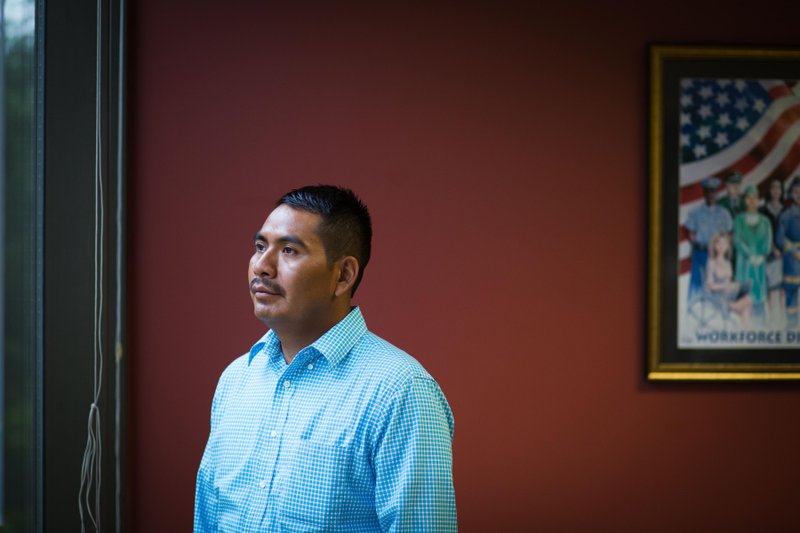ATLANTA -- With Hispanics making up just 2 percent of the state's voters, Georgia isn't usually a place where presidential campaigns go looking for Hispanic support.
FULL ELECTION COVERAGE
But Hillary Clinton is now aggressively wooing Hispanic voters there and in other states with smaller Hispanic populations in hopes of expanding her support in November against Republican Donald Trump.
The efforts in states such as Georgia, North Carolina and Pennsylvania illustrate the extent to which Hispanics are transforming electoral politics beyond competitive states such as Colorado, Florida and Nevada where they have long been a crucial part of the electorate.
"You don't take for granted the Latino community in these states that aren't traditional battleground states, because when you're deciding states by 1, 2 or 4 percentage points, you have to lean on them," said Lorella Praeli, the Clinton campaign's director of Hispanic voter outreach. "You have to be communicating to them bilingually; you need to be sophisticated enough to talk about the issues they care about in the state."
The Clinton campaign announced plans last week to invest more money and manpower in Georgia and Arizona, buoyed by recent surveys showing her trailing Trump by single digits but with widespread Hispanic support. How exactly Clinton plans to campaign and organize in those two states -- which haven't both been won by a Democratic presidential candidate since Bill Clinton did so in 1992 -- is still up for debate, according to campaign officials and Democrats in both states.
It can't happen without voters like Arturo Cerezo. A legal immigrant from Mexico, he decided to become a U.S. citizen and register to vote this year after he and his wife heard Trump talk about deporting illegal aliens.
"We don't know what this guy is going to do in the future, so we said, 'Why not get our citizenship now just in case?'" Cerezo said recently after becoming a U.S. citizen at a federal building in Atlanta.
"We have to express our disapproval by voting," he added. "I don't know how the process works, but I will do whatever I need to do."
Thanks in part to Trump's anti-immigration positions, polls show that Hispanics such as Cerezo are poised to vote this year for Hillary Clinton in overwhelming numbers. But as Cerezo suggested, many will be first-timers or may struggle to grasp the basic details of when and where to vote. That's why the Clinton campaign in the past week hired Jheison Nieto, a former Senate aide, to lead Hispanic voter outreach in Pennsylvania, and Irene Godinez, a former Planned Parenthood official, to do the same in North Carolina.
Albert Morales, a former Democratic National Committee official who was responsible for Hispanic voter engagement, said neither of President Barack Obama's campaigns had Hispanic voter directors in those states. Given Clinton's current strength in states such as Colorado, Virginia and Pennsylvania, "they're hiring because they're not having to spend millions of dollars on TV in Colorado or in the Philadelphia market," he said.
Other Hispanic leaders were more measured in response to Clinton's moves. Arturo Vargas, executive director of the nonpartisan National Association of Latino Elected Officials, faulted her campaign for extending its Hispanic voter outreach into new areas "only as those states come 'into play.' This strategy still ignores the vast majority of the Latino electorate. We are not a three-state or seven-state population. We are a 50-state population and Puerto Rico."
This week the Republican National Committee launched an online campaign to reach Hispanics with a series of videos explaining GOP policy positions -- one of a number of Republican efforts to improve Hispanic outreach.
But a new Fox News Latino poll showed Hispanics' party identification shifting further toward Democrats. Sixty percent of Hispanics identify with Democrats and 21 percent identify with Republicans -- a 6-point swing since 2012, the poll said.
In Georgia, there were 92,000 Hispanics registered to vote at the beginning of the year -- just 2 percent of the state's 4.7 million registered voters, according to the nonpartisan Pew Research Center. That number has nearly tripled since 2004.
"The Latino voting population could be 8 percent but they don't all vote at that rate," said Stacey Abrams, the Democratic state House minority leader who also leads the nonpartisan New Georgia Project. Her group has spent the past 12 years registering voters in minority groups, especially the state's black population, but is now partnering with other organizations to register the fast-growing immigrant populations in the Atlanta metro area.
"If you just hold steady and increase just a little bit in those populations, add that to the African-American vote and add it to the white progressive vote, that's your victory," Abrams said. "To the extent investment comes to Georgia, and particularly the work we're able to do down-ballot, you not only elect Hillary Clinton, you activate voters in those pockets of minority voters where you can take state House races."
A Section on 08/20/2016
